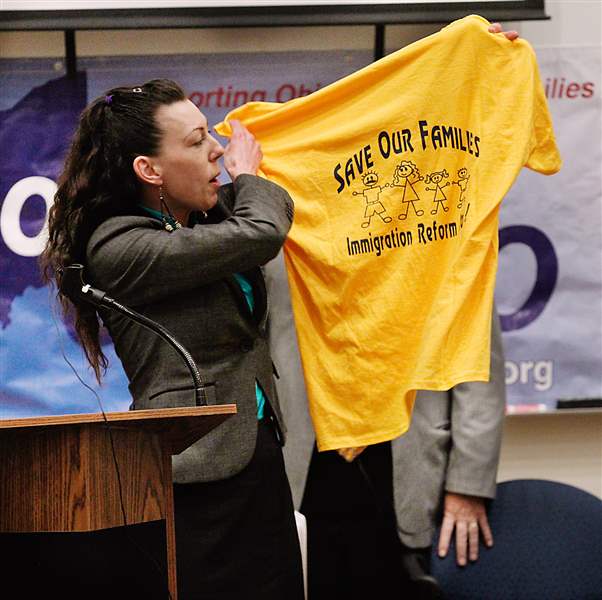
COMMENTARY
Don’t let politics kill immigration reform — again
The need to bring America’s 11 million undocumented immigrants out of the shadows, and fully into the nation’s economic and social life, is as acute as it ever was
2/9/2014
A speaker at a town-hall meeting at the University of Toledo last year encourages the audience to support immigration reform.
THE BLADE
Buy This Image

Kushma
Will Congress finally pass a meaningful immigration reform bill in 2014? That will depend largely on whether Republican lawmakers, especially in the GOP-controlled House, are more concerned about pandering to a narrow base or appealing to a broad segment of voters.
If they’re mostly worried about challenges from their party’s nativist right, they’ll continue to block action on the issue. If they want to reach a wider electorate in November — especially Latinos and Asian-Americans — they’ll work with President Obama and congressional Democrats to forge a sensible compromise.
The need to bring America’s 11 million undocumented immigrants out of the shadows, and fully into the nation’s economic and social life, is as acute as it ever was. Fixing the broken system of legal immigration, especially the rules that govern temporary workers and the unconscionable delays and restrictions in the process of awarding visas and green cards, remains just as important for economic growth and prosperity.
Last year, a bipartisan reform measure passed by the Senate and backed by the President died in the House. For a while, there appeared to be hope, albeit faint, for progress this year.

A speaker at a town-hall meeting at the University of Toledo last year encourages the audience to support immigration reform.
House Republican leaders, headed by Speaker John Boehner of Ohio, offered a set of principles to guide their party’s piecemeal approach to reform. They aren’t particularly expansive, but they are more enlightened than Republican presidential nominee’s Mitt Romney’s proposal during the 2012 campaign that illegal immigrants “self-deport.”
Last week, though, Mr. Boehner warned that the House likely will not act this year because of Republican distrust of Mr. Obama. Such a lame excuse won’t and shouldn’t fool anyone.
Previously, the speaker and his colleagues had held open the possibility of legalization, provided that undocumented immigrants “get right with the law.” That’s a start, but a genuine path to citizenship would still be better for those who are willing to pay an appropriate penalty, maintain a clean criminal record, and meet other requirements to gain full membership in our national community.
Creating such a path isn’t a question of amnesty — the favorite code word of restrictionists. Neither should it be a matter of forcing anyone to settle for second-class citizenship.
Reform skeptics insist that stricter enforcement of existing immigration law must precede any talk of legalization. That’s happening: Late last month, a federal grand jury indicted a North Carolina company that finds foreign workers for farm and other jobs in this country on charges of falsifying visa applications and placing some workers with employers illegally. The company denies the charges.
Mr. Obama has shown his own zeal for enforcement by deporting almost 2 million people since he took office. Demands by some Republicans for absolute — and unattainable — border security and other oppressive measures to police workplaces and harass immigrants are merely efforts to kill reform, and should be seen as such.
Enforcement should remain the specialized responsibility of the federal government, not state and local police agencies that are not trained to focus on immigration law and have more urgent work to do. Federal enforcement has never been tougher.
While we wait for Congress to act (or not), states can do things on their own to help talented young people whose families brought them to the United States illegally, but who were raised as Americans. A growing number of states — 16 at last count — allow undocumented resident students to pay in-state tuition at public universities and colleges. These include such Republican-dominated places as Texas and Kansas.
But neither Ohio nor Michigan has such a law. The Ohio Board of Regents allows undocumented students who have gotten green cards to pay in-state tuition. Michigan leaves the matter up to individual schools.
Both states need a broader policy, as a matter of economic self-interest rather than a giveaway to anyone. Undocumented students have graduated from high school in our states, generally at public expense. Under a presidential order, many of them live and work in this country legally, without immediate fear of being deported. Their parents pay taxes here.
Charging such students more-expensive out-of-state tuition, even as they pursue legal immigration status, only makes it more likely that they will not be able to attend college. That dampens their earning and job-creating — and taxpaying — potential. Lawmakers in Columbus and Lansing might even consider allowing undocumented students to receive financial aid from state schools, as Texas and California do.
The immigration statement by congressional Republicans notes: “One of the great founding principles of our country was that children would not be punished for the mistakes of their parents.” That’s a change from their position three years ago, when they opposed the Dream Act, which would have legalized many undocumented young people. Their statehouse counterparts should take that wisdom to heart.
Local communities can make themselves more appealing to immigrants as well. Rick Snyder, the Republican governor of Michigan, wants to help rebuild Detroit by bringing 50,000 highly skilled and well-educated immigrants to the bankrupt city to live, work, start businesses, and create jobs in such fields as engineering, health care, and advanced technology.
Mr. Snyder’s plan would require a special allocation of visas by the federal government, but no large financial outlay. Hard-pressed Ohio cities, including Toledo, should be preparing their bids as well, rather than continue to watch immigrants take their hard work and expertise abroad.
Many Republicans argue that their party doesn’t have to make a special push on immigration this year — that the GOP can appeal to the growing numbers of Hispanic and Asian-American voters solely on the strength of its ideas. Poll data and recent election results suggest otherwise.
The details of any bill will be critical. But we can have a bipartisan compromise on rational, workable reform, once Republicans and Democrats understand that it is in their political self-interest, as well as for the good of the country, to make that happen.
David Kushma is editor of The Blade.
Contact him at: dkushma@theblade.com or on Twitter @dkushma1